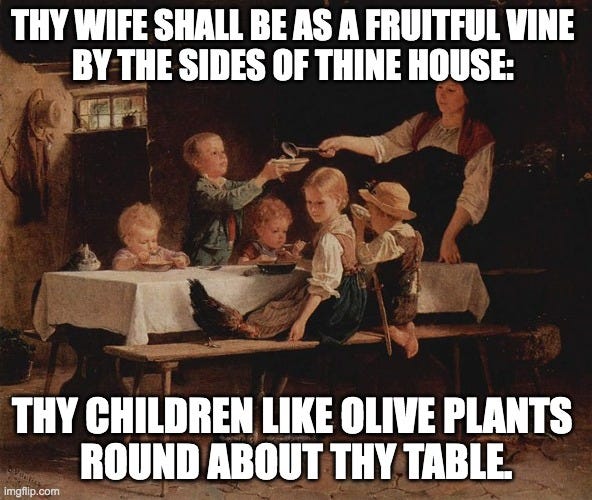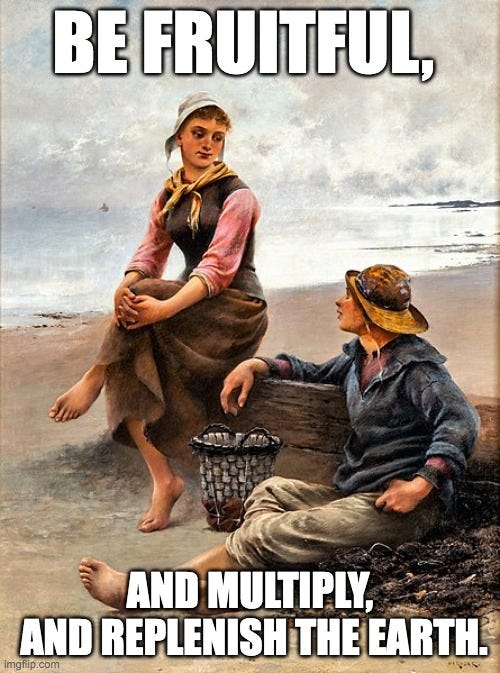I had a fascinating discussion with a progressive about the subject of ‘natalism’. Her argument was the progressive policies were more pro-natal than those of Trump and MAGA. I had to shake my head at the sheer insanity of the comparison. Progressive policies are, often overtly, anti-natal. Trump has, at least, had children. But I’m not exactly blowing a horn for his policies either.
But while having the discussion, and we were discussing whether the level of the ‘state’ or the ‘culture’ were the proper levels to deal with issues of fertility and natalism, something hit me. (I was actually driving a tractor at the time, if that interests you.) Namely this: In order for a ‘pro-natal policy’ to succeed, it is important to understand if we are dealing with people who want to have kids.
Pre or Post
Now let me hurriedly explain. Let me propose two groups of people. Two couples, perhaps:
Couple A wants to have children. In a perfect world she would be popping them out like bunnies, and he would be happily dandling them on his knees.
Couple B does NOT want to have children. In their perfect world they would be taking cruises round the world on ‘adult only’ ships. They love each other, and enjoy sex, but in their perfect world nothing would result.
Now, what I am saying is that when you start working on your policies, when you think about how they affect these two couples, you have to understand the differences between them. You have to understand the difference between ‘want to but can’t’ and ‘don’t want to’.
Opera
I was thinking of how to explain this when a word hit me… Opera. (It can be dangerous when words hit you when you are driving a tractor, although not as dangerous as when tree branches hit you. Don’t worry, I’m fine.) Let’s think about opera for a second…
Wait, what, you don’t want to? That’s my point! Except for Bugs Bunny in the Barber of Seville (one of the all time greatest works of entertainment, ever) I hate opera. I dislike opera. I spurn opera. I wouldn’t go to the opera if you mailed me free tickets…
And there’s my point! Suppose you were to mail everyone in the US free tickets to the opera. Leaving aside transportation costs and full seats… a lot of us would not go. We would not think of going. Because… we do not wish to go to the opera. I would not watch it on a train, I would not watch it in the rain… etc etc.
Culture
Which brings us to the question of culture. It is all very well to speak of giving people tax breaks for having children, but we need to know… are we merely opening a door, or trying to push someone through it?
Unlike opera, the having and raising of children, the issues of marriage and sexuality, are profoundly cultural and a profound part of culture. Profound meaning deep, meaningful, standing beneath and connected to dozens of other parts of culture.
Suppose that you were to marry into a family that insisted that you leave your shoes at the door, and that was not the way you were raised. Well, it might take you a while to get used to it but, in the long run, it wouldn’t be that big a deal.
But suppose, instead, you were to marry into a family that insisted you take all of your clothes off at the door. It’s all very natural and all that, and why would family need to be dressed in front of family. (And friends, if they come over.) I think most Americans (and Brits) would find that a touch harder to get used to, eh? (And Canadians)
Culture is a huge thing, which comes into us with our mother’s milk, and can’t be driven out of us with a few government policies.
Instinct
Similarly, although often acting in opposition, you have instinct. Human beings have an instinct toward procreation. A desire for the activity that produces it, and a deep desire for the children themselves. Society and culture often fight against this instinct, and there are other, competing instincts, but no government policy is rational that doesn’t take that instinct into account.
Conclusion
So this is not a policy paper. I am proposing here a foundation for policy. An understanding of what must lie underneath policy… an understanding of the canvas that the policy is painted on.
I am saying that before you speak about how to encourage people to go to the opera, you must consider that you may be speaking to two different groups. Are you speaking to people who love opera, would love to go to opera, who dream of opera every night… but who are prevented from going by the cost of tickets, the distance to travel, the fewness of the seats in their local opera house? Or are you speaking to people who hate opera, despise opera, and want nothing at all to do with opera.
Underlying all policy prescriptions is the culture of those upon whom the policy is set to operate. In the current case, there is a generation of people who despise marriage, and despise children. Free opera tickets won’t change this. We will need to dig much, much, deeper.
So much of the policy debate, including the post I was responding to, leave out the deeper issues entirely. They seek to make having children easier, less onerous… but usually leave out addressing any discussion of the underlying desire for (or against) having and raising children on the part of the individuals but, even more profoundly, the culture.
—
Thank you for reading Von’s Substack. I would love it if you commented! I love hearing from readers, especially critical comments. I would love to start more letter exchanges, so if there’s a subject you’re interested in, get writing and tag me!
Being ‘restacked’ and mentioned in ‘notes’ is very important for lesser-known stacks so… feel free! I’m semi-retired and write as a ministry (and for fun) so you don’t need to feel guilty you aren’t paying for anything, but if you enjoy my writing (even if you dramatically disagree with it), then restack, please! Or mention me in one of your own posts.
If I don’t write you back it is almost certain that I didn’t see it, so please feel free to comment and link to your post. Or if you just think I would be interested in your post!
If you get lost, check out my ‘Table of Contents’ which I try to keep up to date.
Von also writes as ‘Arthur Yeomans’. Under that name he writes children’s, YA, and adult fiction from a Christian perspective. His books are published by Wise Path Books and include the children’s/YA books:
The Bobtails meet the Preacher’s Kid: A Christian historical fiction chapter book about four orphans who go to live with their aunt on a dairy farm.
The Bobtails and the Cousins: The sequel to Preacher’s Kid. The aunt has married, and the cousins come to visit. Meaning town kids dealing with chores and manure and…
The Bobtails go to France: The sequel to cousins. The Bobtails, and Preacher’s Kid, get to take a trip to New York, London, Paris, and a small town in France. To get some cheese.
and
No Ordinary School: A brilliant but socially clueless boy gets recruited for a special school. Where he makes a lot of money, gets a girl, and solves a mystery.
As well as GK Chesterton’s wonderful book, “What’s Wrong with the World”, for which ‘Arthur’ wrote most of the annotations.
Arthur also has a substack, and a website. On the substack you can listen to some of his published books. Free.
Thanks again, God Bless, Soli Deo gloria,
Von







You don't like Opera? I can't believe we are friends when you talk like that. 🤣 It's okay. I can't stand rap, so maybe we can be friends after all.
As much as I'd love to have adopted every child we fostered, it didn't happen. We were lucky to get the two we did. My wife is medically unable to have children, and I don't have any of my own blood.
I have never understood why people who can children at the drop of a hat want to kill them all, nor have I understood why it's so hard for a good Christian couple to adopt as many children as they want.
Anymore, Christians are being denied fosterships because they won't support the LGBT+pedo crowd.
I can foresee a time when our population will drop so far that our civilization simply implodes.
Those who don't want children should have no say in how children are raised. But even that doesn't stop them. They just start preaching the failed religion of communism and family depopulation.
I would add a third category. Those who don't like opera because they think it's bad but know nothing about it or have only been exposed to bad opera. So a policy of education, possibly influence, would be in order. They could end up going either way, but now it would be an informed decision.
I agree with your argument about policy basics.